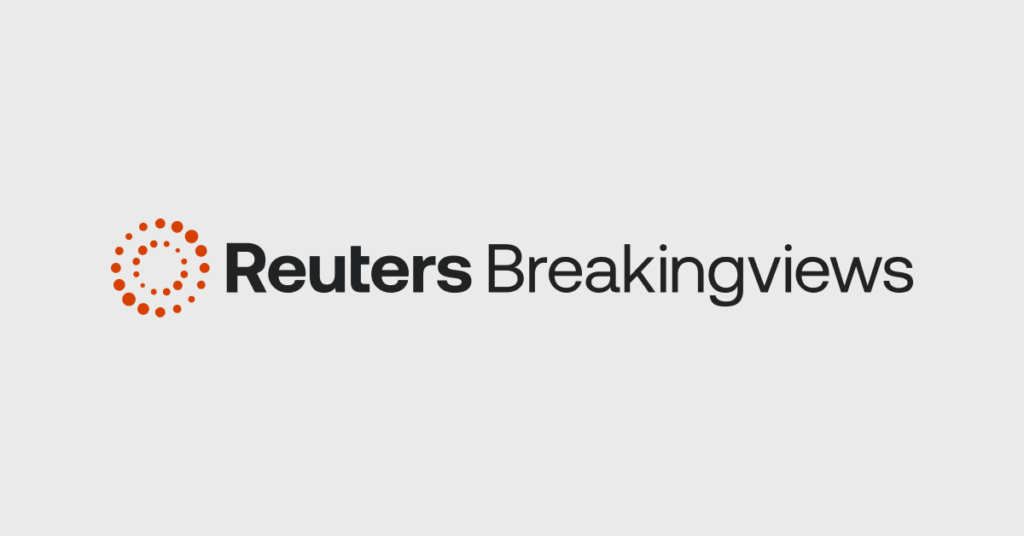The Federal Council reckons the bank can mitigate the effects of a new capital rule, leaving its equity ratio at a manageable-seeming 15%. An expert report suggests 17%-19%, which would sap returns. Bridging the gap could require offloading more assets – or even whole businesses.
Donald Trump’s $1.4 trln Gulf deal spree involves a plan to build data centres in the UAE for groups like OpenAI. The benefits of lower costs are offset by the risk of technology leakage, and an untested legal framework. The danger is that a future president tears them down.
The $15 bln UK moneychanger may shift its main trading venue to gain more American investors and liquidity. It could achieve similar ends by staying put and pushing for FTSE inclusion. A premium valuation suggests little upside, and many pond-hoppers have badly underperformed.
Carlyle, Blackstone and other private equity practitioners are commiserating this week over German pastries and pilsner. The consensus: asset-backed credit is hot, while $4 trln of buyout assets are stuck for years. Fundraising may be a slog, turning some managers into zombies.
Microsoft, Alphabet, Amazon.com and Meta Platforms are set to spend $320 bln this year on data centres and other kit to power advanced chatbots. In this Viewsroom podcast, Breakingviews columnists explain why investors are willing to support a long game that will yield a return.
The $3 bln cognac maker followed Diageo and Pernod Ricard in ditching long-term sales goals. To cope with levies and sluggish demand in markets like China it needs to spend more on advertising and develop fresh products, not just cut costs. That means sacrificing its dividend.
KKR dropped a bid to save the sickly water group. That leaves an uncertain recapitalisation led by holders of $27 bln of debt like Elliott, or a risky state rescue. The botched deal is a bad look for finance minister Rachel Reeves’ plan to boost foreign investment.
The $6 bln neobank turned a profit for the second year in a row, thanks to rising deposits and still-high UK rates. More lending, hedging and bond-buying should help the group prepare for falling yields. The risk is that a bank-like model implies a subdued bank-like valuation.
The French drugmaker will pay up to $9.5 bln for Blueprint Medicines, whose key product fights skin rashes. It eases CEO Paul Hudson’s relative dearth of new drugs, without obviously exposing him to Donald Trump’s drug price crusade. And Sanofi has a path to adequate returns.
Donald Trump’s antics have dented the dollar. Now his row with Harvard and crackdown on international students is undermining colleges. Though rivals face challenges, the president’s scattergun tactics mean the US stands to lose a chunk of the $50 bln economic benefit to others.
Dai-ichi Life will buy 15% of Britain’s $8 bln life-to-fund group M&G. Overseas expansion makes sense for the Japanese side given a shrinking home market, while its partner is cheap and has private-market chops. The UK group’s growth plan gets a leg up, as do its M&A defences.
Weight loss treatments pioneered by Novo Nordisk and $687 bln Eli Lilly may help delay aging and cut cancer or Alzheimer’s risk. That suggests they could be used more widely than for just people with weight issues. Yet the revolution will be slow, and lead to more competition.
Foreigners own US stocks and bonds worth $30 trln, much of it unhedged. Doubts over the greenback’s status threaten to leave global pension funds and insurers with an intolerable currency mismatch. If they respond with increased hedging or selling, the dollar will weaken further.
The $30 bln Jeep seller picked operations head Antonio Filosa. It reinforces a trend for auto groups, amid tariff-induced manufacturing issues, to choose proven insiders rather than software or consumer pros. Stellantis’s woes, which include a US sales crisis, will be a slow fix.
The fast-fashion firm, once valued at $100 bln, may list in Hong Kong after failing to get a Chinese regulator’s OK for a London float, Reuters reported. The big question is whether its Western business works with US and EU levies. The Plan B could presage a tough regional pivot.
The hedge fund manager plans to convert a $422 mln UK-listed fund into an insurer to bet on corporate debt. It’s a high-returning strategy made famous by Apollo boss Marc Rowan, but some investors would rather get their money back. Untested demand in the UK adds to the risk.
The market meltdown hypothesis, popular in the 1990s, held that equity sales by retiring baby boomers would swamp demand from their juniors, crashing the market. It seemed wrong for a while, partly because of globalisation. But the idea may now, belatedly, be having its day.
The dollar-pegged digital coin issuer is nearing a listing as US legislators prep crucial regulation. Hitting a valuation of $9 bln rests on dreams of being a crypto rival to Visa. Yet with profit dependent on interest rates, it makes more sense as a product in a larger platform.
The US private equity firm may make an annualised return of at least 20% from a sale or IPO of Novo Banco, worth perhaps 6 bln euros. Scooping up roadkill after a crisis can be lucrative, but the payoff also owes a lot to recent rate hikes. European banks are tougher targets now.
Jakob Stausholm will retire from the $107 bln miner after just over four years. He delivered respectable returns, but led an expensive charge into lithium and leaves Rio Tinto’s unwieldy dual listing structure intact. That could complicate his heir’s scope for green-metal M&A.





















